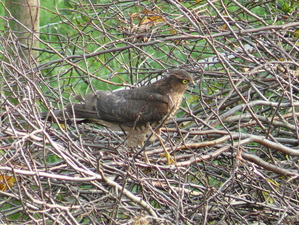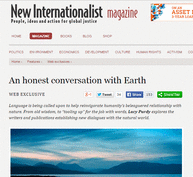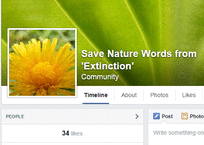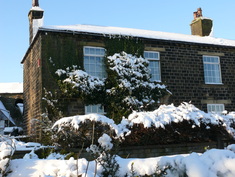 Sparrowhawk from the window by Laurence Rose
Sparrowhawk from the window by Laurence Rose This annual celebration of the commonplace is one time when we reconnect with wildlife en masse. It is a positive that we can take out of the background trend of declining contact with nature; a note of hope that marks the end of a fortnight in which many of us have been reflecting on that sad and dangerous trend.
Positive News, the world’s first positive newspaper, can be relied upon to find inspiration in the loss of nature words from children’s vocabularies. Lucy Purdy, a London-based freelance journalist specialising in environmental and ethical issues, writes that “despite this, a new breed of writers and publications are using language, and new perspectives, to reinvigorate our relationship with the natural world.”

Dominick Tyler has himself been blogging about the Oxford Junior Dictionary. Tyler’s Landreader Project has been collecting words for landscape features, like jackstraw, zawn, clitter and logan, swash, cowbelly, hum and corrie, spinney, karst and tor. Lucy Purdy describes it as a stirring synthesis of people and place. Already, more than 2,000 terms and words have been gathered, and in March Tyler will publish a book based on the project, titled Uncommon Ground.
In his latest blog, Tyler reflects on the list of words omitted from the OJD, which he considers as “a kind of prose-poetry supplement to be administered like a multivitamin as a defense against lexical malnutrition. Perhaps we can intone it to our children and, even better, seek out each of those things it names and show them.”
Nature isn't an optional extra

In Italy, English teacher and mother of twin girls Nadia Stevenson read about #naturewords with alarm, and wrote to author Rob Macfarlane, one of the twenty-eight who wrote to the Oxford University Press last week. “I've been pondering all day as to what can be done. Although I'm just one small voice in the huge scheme of things, I have an immense love and esteem for the natural world of which we are part, as well as great hope for my daughters' futures.”
So two days ago Nadia set up a Facebook page Save Nature Words from Extinction. On the page she writes: “While we may choose to what extent technology is or isn't part of our lives, we cannot escape the fact that we ARE part of the natural world, it isn't an optional extra.”
I'm hoping to see a starling
| Glancing out of the window, I have to peer round the ivy I keep forgetting to trim, to get a full view of the garden. There’s the gorse and the hazel and holly bushes I planted fifteen years ago, and the willows and ash trees that planted themselves a hundred years before. A magpie flies past and I can hear a wren singing despite the double glazing. I hope tomorrow there will be a starling for my Birdwatch hour. They’ve dwindled here, as they have everywhere, and are mainly a summer visitor to this hamlet. And I see how easy it is to write a paragraph about an everyday view in which all the nature words are on the cull list. #naturewords |

 RSS Feed
RSS Feed
